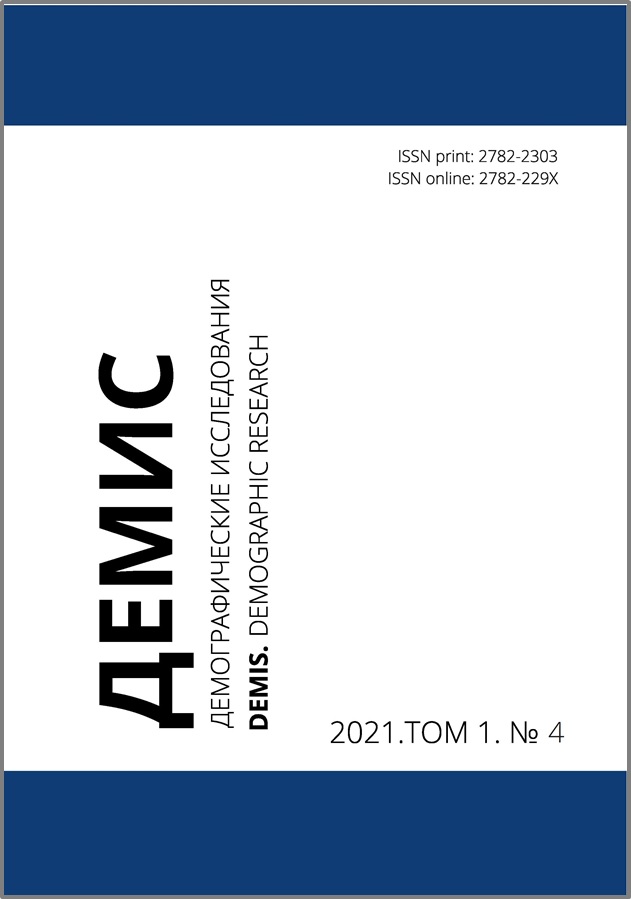Миграционные процессы в контексте теорий поведенческой экономики
Научная статья
Аннотация
Литература
2. Сарыглар С. А., Максимова Г. М. Миграционное поведение: стратегии и практики социальной интеграции, специфика адаптивного поведения мигрантов в Азиатском приграничье России // Society and Security Insights. 2020. Т. 3. № 1. С. 37–48. DOI: https://doi.org/10.14258/ssi(2020)1-02.
3. Рыбаковский Л. Л. Миграция населения: учебное пособие для вузов. – Москва: Издательство Юрайт, 2020. – 480 с. ISBN: 978-5-534-11727-1.
4. Carling J., Czaika M., Bivand Erdal M. Translating Migration Theory into Empirical Propositions. QuantMig Project Deliverable, 1. Southampton: University of Southampton, 2020. 28 p.
5. Захарова Ю. В. Поведенческие аспекты принятия решений в эпоху цифровизации // Цифровой регион: опыт, компетенции, проекты. Сборник статей Международной научно-практической конференции. – Брянск: Брянский государственный инженерно-технологический университет, 2018. С. 181–183.
6. Маркелов А. Ю. Влияние склонности к риску на результаты экономической активности в условиях совершенной экономики: результаты экспериментального исследования // Системогенез учебной и профессиональной деятельности. Материалы VIII всероссийской научно-практической конференции. Под ред. Ю. П. Поваренкова. – Ярославль: Ярославский государственный педагогический университет им. К. Д. Ушинского, 2018. С. 244–247.
7. Паниди К. А. Нобелевская премия по экономике – 2017: вклад Ричарда Талера // Экономический журнал Высшей школы экономики. 2017. Т. 21. № 4. С. 702–720.
8. Benartzi S., Beshears J., Milkman K. L., Sunstein C. R., Thaler R. H., Shankar M., Tucker-Ray W., Congdon W. J., Galing S. Should Governments Invest More in Nudging? Psychological Science. 2017. Vol. 28. No. 8. Pp. 1041–1055. DOI: https://doi.org/10.1177/0956797617702501.
9. Afif Z., Islan W. W., Calvo-Gonzalez O., Dalton A. G. Behavioral Science Around the World: Profiles of 10 Countries. Washington D.C.: World Bank Group, 2019. 161 p.
10. Kallbekken S., Sælen H. ‘Nudging’ hotel guests to reduce food waste as a win–win environmental measure. Economics Letters. 2013. Vol. 119. No. 3. Pp. 325–327. DOI: https://doi.org/10.1016/j.econlet.2013.03.019.
11. Kahneman D., Tversky A. Prospect Theory: An Analysis of Decision Making under Risk. Econometrica. 1979. Vol. 47. No. 2. Pp. 263−292. DOI: https://doi.org/10.2307/1914185.
12. Поведенческая экономика: современная парадигма экономического развития: монография / под ред. Г. П. Журавлевой, Н. В. Манохиной, В. В. Смагиной; ТРО ВЭО России, ФГБОУ ВО «Рос. экон. ун-т им. Г.В. Плеханова», Научная школа «Экономическая теория» в РЭУ им. Г. В. Плеханова. – М.; Тамбов: Издательский дом ТГУ им. Г.Р. Державина, 2016. – 340 c. ISBN: 978-5-00078-086-2.
13. Дружинин В. Н. Экспериментальная психология: учебник. – Санкт-Петербург: Питер, 2008. – 320 с. ISBN: 978-5-8046-0176-9.
14. Хаджиев И. В., Ананченко И. В. Влияние когнитивных искажений на разработку пользовательских интерфейсов // Научная дискуссия современной молодежи: актуальные вопросы, достижения и инновации. Cборник статей Международной научно-практической конференции. – Пенза: Наука и Просвещение, 2016. С. 47–49.
15. Cohen J. B., Goldberg M. E. The Dissonance Model in Post-Decision Product Evaluation. Journal of Marketing Research. 1970. Vol. 7. No. 3. Pp. 315–321. DOI: https://doi.org/10.1177/002224377000700305.
16. Sanna L. J., Schwarz N. Integrating Temporal Biases: The Interplay of Focal Thoughts and Accessibility Experiences. Psychological Science. 2004. Vol. 15. No. 7. Pp. 474–481. DOI: https://doi.org/10.1111/j.0956-7976.2004.00704.x.
17. Васин А. А. Эволюционная теория игр и экономика. Часть I. Принципы оптимальности и модели динамики поведения // Журнал Новой экономической ассоциации. 2009. № 3–4. С. 10–27.
18. Белянин А. В. Ричард Талер и поведенческая экономика: от лабораторных экспериментов к практике подталкивания (Нобелевская премия по экономике 2017 года) // Вопросы экономики. 2018. № 1. С. 5–25. DOI: https://doi.org/10.32609/0042-8736-2018-1-5-25.
19. Thaler R. H., Shefrin H. M. An Economic Theory of Self-Control. Journal of Political Economy. 1981. Vol. 89. No. 2. Pp. 392–406. DOI: https://doi.org/10.1086/260971.
20. Буктугутова Р. С., Жанаева Г. К. Демографические последствия освоения целинных и залежных земель в Казахстане (некоторые аспекты) // Наука и реальность. 2021. № 2(6). С. 154–157.
21. Кашапова Э. Р., Рыжкова М. В. Когнитивные искажения и их влияние на поведение индивида // Вестник Томского государственного университета. Экономика. 2015. № 2(30). С. 15–26. DOI: https://doi.org/10.17223/19988648/30/2.
22. Tuyls K., Nowe A., Lenaerts T., Manderick B. An Evolutionary Game Theoretic Perspective on Learning in Multi-Agent Systems. Synthese. 2004. Vol. 139. No. 2. Рp. 297-330. DOI: https://doi.org/10.1023/b:synt.0000024908.89191.f1.
23. De Haas H. International Migration, Remittances and Development: Myths and Facts. Third World Quarterly. 2005. Vol. 26. No. 8. Рp. 1269–1284. DOI: https://doi.org/10.1080/01436590500336757.
24. Czaika M., Vothknecht M. Migration and Aspirations – Are Migrants Trapped on a Hedonic Treadmill? IZA Journal of Migration. 2014. Vol. 3. No. 1. DOI: https://doi.org/10.1186/2193-9039-3-1.
Поступила: 02.08.2021
Опубликована: 06.12.2021






